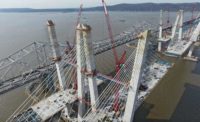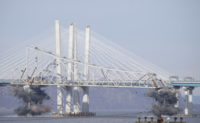Transportation
NY Cuomo Bridge Lawsuit Focuses on Stay Cable Anchors

The NY State Thruway Authority alleges that 62 of 192 cables do not meet specs.
Photo courtesy TZC
The $3.14-billion Gov. Mario M. Cuomo Bridge is again the subject of litigation, amid claims by the New York State Thruway Authority that anchor components for nearly one-third of the Hudson River crossing’s 192 stay cables do not meet durability specifications.
A complaint filed Aug. 22 by the agency in New York State Supreme Court in Albany alleges that the Tappan Zee Constructors (TZC) design-build consortium refused to fulfill its contractual obligation to retrofit edge-girder anchor pipes for 61 cables that an agency-commissioned independent safety review found do not meet material requirements.
TZC, which completed the 3.1-mile bridge in 2018, is composed of Fluor Corp., Granite Construction Inc., Traylor Bros. Inc., and American Bridge Co. All are named as co-defendants in the lawsuit along with their co-sureties.
Authority spokesperson Jennifer Givener says that while the affected cable systems have been deemed safe for the bridge to remain open without restrictions for its approximately 140,000 daily users, the agency “has begun the process to retrofit and reinforce these components under the guidance of nation-leading experts in material science, engineering and design.”
HNTB is serving as the authority’s engineer for the project, Givener adds, but an outside contractor has not yet been selected to perform the retrofit work.
The lawsuit seeks a minimum of $6 million to recover costs of evaluation and remediation of these components to ensure durability throughout the bridge’s 100-year design life. The authority, Givener says, “is committed to ensuring contractor compliance to guarantee the toll payers get what they paid for in the construction of the Governor Mario M. Cuomo Bridge.”
Fluor, which led the TZC consortium, did not respond to a request for comment.
The latest lawsuit comes three years after the Thruway Authority rejected all but $28 million of TZC’s $930-million claim of extra construction costs incurred to replace the traffic-burdened 1950s-era Tappan Zee Bridge between Rockland and Westchester counties. Although a state-appointed advisory panel eventually upped the award to TZC to more than $101 million, the dispute has yet to be settled.
TZC’s $45-million lawsuit against demolition contractor Foothills Bridge Co. for additional costs the consortium says were incurred by the unplanned use of explosive demolition, was discontinued in February 2022 with prejudice in an agreement between both parties.
TZC in 2106 also sued a subcontractor, Maxon Industries, which supplied a floating concrete batch plant that collapsed in 2014.
TZC also reached an undisclosed settlement in a whistleblower lawsuit that faulted the consortium for repeated instances of broken bolts during construction and resulted in the worker’s unfair termination.
The text of this article has been updated to clarify the status of some of the past lawsuits related to TZC and the Cuomo Bridge project.



